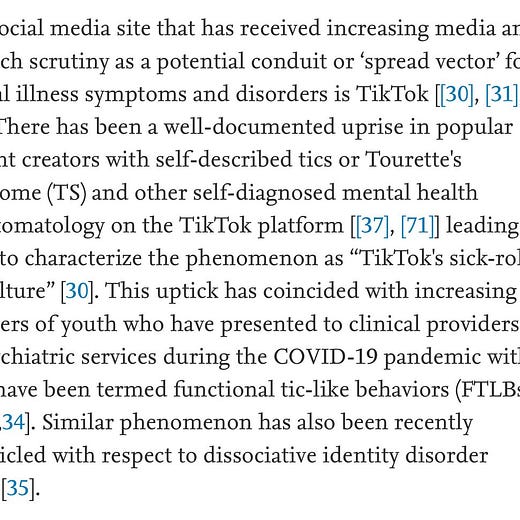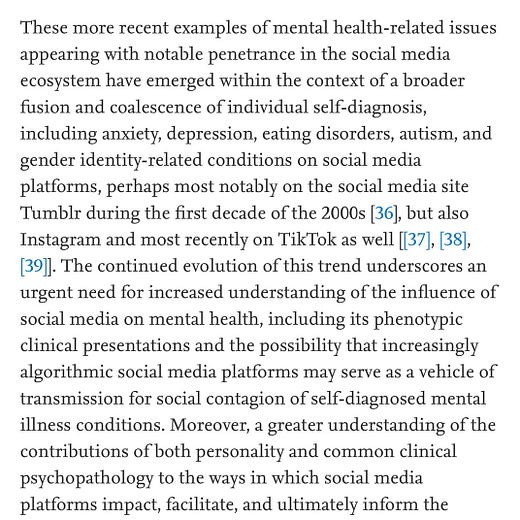The Long Game 137: Health & Fitness Trends for 2023, Mental Illness Through Social Media, Choices, Chesterton’s Fence
🔨 Find Out What You’re Good at and Pound Away at it Forever, Peer Review, Identity, Annul Review, Training Hard, Running at 200+lbs, and Much More!
Hi there, it’s Mehdi Yacoubi, co-founder at Vital, and this is The Long Game Newsletter. To receive it in your inbox each week, subscribe here:
In this episode, we explore:
Health & Fitness Trends for 2023
Mental illness — or rather, self-diagnosed mental illness — can spread via social media
Choices, Calendar, Not Talking, Showing
Find out what you’re good at and pound away at it forever
Chesterton’s Fence
Let’s dive in!
🥑 Health
📈 Health and Fitness Trends of 2023
I liked this article covering some of the significant health & fitness trends of 2023. Here are the trends:
The Wealthy Will Turn Away From Fancy Food Trends
A Machine Might Write Your Next Workout Plan
Gyms Will Replace Churches
“My big trend for the year is the increased popularity of “third places” dedicated to wellness and fitness. From members-only clubs to climbing gyms and wellness studios, fitness-focused third places want to restore a sense of community. 30 percent of millennials and Gen Z have no religious affiliation, per Gallup. Meanwhile, church membership among U.S. adults recently fell below 50 percent for the first time. As participation in organized religion declines alongside a growing distrust of social institutions, younger generations increasingly worship at the church of wellness. With covid precautions gone for most, individuals starved for human connection are venturing out in search of belonging and well-being.
–Anthony Vennare, co-founder of Fitt Insider”
More People Will Choose Strength Training As Their Go-To Workout (Great! 💪)
The Steroids Silence Might Finally End
Elite Marathoners Will Race More Than Twice a Year
The Recovery Market Will Continue to Expand
Women’s Sports Will Surge
Additionally, these are some other trends I personally think will become major in the years to come. Of course, my opinion is biased by what I’m interested in!
Better-for-you energy drinks
Grass-fed meat delivery
Nootropics
Supplement lines focused on the traceability of their ingredients
Natural bodybuilding/strength training. As more and more people are open about their use, I see a bifurcation in the future where natty & enhanced lifting become two entirely different things.
Hybrid training (mix of endurance & strength)
Health communities
Sobriety
Older people taking on strength training
Wellness retreats (cold exposure, sauna, etc.)
Brazilian Jiu Jitsu becoming mainstream and maybe reach Judo levels in a few years (3M vs. 40M currently)
Strongman as an alternative to Crossfit
✨ Start 2023 the right way:
Are you looking to get healthier, fitter, and feel better in 2023? Join us on Vital and share your health & fitness journey with the community. It’s been awesome to see users radically improve & step up their game as they interact with the other users.
🌱 Wellness
😣 Mental illness — or rather, self-diagnosed mental illness — can spread via social media
I found this paper very interesting and concerning.
Abstract: There has been an increasing recognition among both medical and psychological professionals, as well as the public media, of a concerning trend for child and adolescent users of audiovisual-based, algorithmic social media platforms (e.g., TikTok) to present with or claim functional psychiatric impairment that is inconsistent with or distinct from classic psychiatric nosology. In this short communication, we provide a detailed historical overview of this transdiagnostic phenomenon and suggest a conceptual model to organize thinking and research examining it. We then discuss the implications of our suggested model for accurate assessment, diagnosis, and medical-psychiatric treatment. We believe there is an urgent need for focused empirical research investigation into this concerning phenomenon that is related to the broader research and discourse examining social media influences on mental health.
Here are some more ideas from the paper:
One social media site that has received increasing media and research scrutiny as a potential conduit or ‘spread vector’ for mental illness symptoms and disorders is TikTok. There has been a well-documented uprise in popular content creators with self-described tics or Tourette's Syndrome (TS) and other self-diagnosed mental health symptomatology on the TikTok platform leading some to characterize the phenomenon as “TikTok's sick-role subculture”. This uptick has coincided with increasing numbers of youth who have presented to clinical providers or psychiatric services during the COVID-19 pandemic with what have been termed functional tic-like behaviors (FTLBs). Similar phenomenon has also been recently chronicled with respect to dissociative identity disorder (DID).
These more recent examples of mental health-related issues appearing with notable penetrance in the social media ecosystem have emerged within the context of a broader fusion and coalescence of individual self-diagnosis, including anxiety, depression, eating disorders, autism, and gender identity-related conditions on social media platforms, perhaps most notably on the social media site Tumblr during the first decade of the 2000s, but also Instagram and most recently on TikTok as well. The continued evolution of this trend underscores an urgent need for increased understanding of the influence of social media on mental health, including its phenotypic clinical presentations and the possibility that increasingly algorithmic social media platforms may serve as a vehicle of transmission for social contagion of self-diagnosed mental illness conditions. Moreover, a greater understanding of the contributions of both personality and common clinical psychopathology to the ways in which social media platforms impact, facilitate, and ultimately inform the emerging debate about the definitions and contours of what is and is not considered mental ill-health is needed.
🧠 Better Thinking
⚖️ Choices, Calendar, Not Talking, Showing
It might be a good time of the year to reshare the classic:
Don’t tell me what your priorities are, show me your calendar.
Open your calendar and imagine an outsider was looking at it. What would they say you’re about?
If it’s not the obvious thing(s) you’re trying to do, then this might be something to address.
One of the worst things that can happen is when you don’t realize your current life, habits, and choices won’t lead you to the life you want.
Additionally, I think a lot of the debate around work, life, balance, and more comes from people having different goals (explicit or not in their minds) and also a clear (or unclear) understanding of what sacrifices will be needed to get there.
⚡️ Startup Stuff
🔨 Find out what you’re good at and pound away at it forever
Here is a simple quote to start the year:
You have to figure out what your own aptitudes are. If you play games where other people have the aptitudes and you don't, you're going to lose.
And that's as close to certain as any prediction that you can make.
You have to figure out where you've got an edge. And you've got to play within your own circle of competence.
📚 What I Read
🕳 Chesterton’s Fence: A Lesson in Second Order Thinking
This is an idea I can’t stop thinking about. I see it happening in so many parts of society.
Do not remove a fence until you know why it was put up in the first place.
Chesterton went on to explain why this principle holds true, writing that fences don’t grow out of the ground, nor do people build them in their sleep or during a fit of madness. He explained that fences are built by people who carefully planned them out and “had some reason for thinking [the fence] would be a good thing for somebody.” Until we establish that reason, we have no business taking an ax to it. The reason might not be a good or relevant one; we just need to be aware of what the reason is. Otherwise, we may end up with unintended consequences: second- and third-order effects we don’t want, spreading like ripples on a pond and causing damage for years.
📉 The rise and fall of peer review
Why the greatest scientific experiment in history failed, and why that's a great thing:
For the last 60 years or so, science has been running an experiment on itself. The experimental design wasn’t great; there was no randomization and no control group. Nobody was in charge, exactly, and nobody was really taking consistent measurements. And yet it was the most massive experiment ever run, and it included every scientist on Earth.
Most of those folks didn’t even realize they were in an experiment. Many of them, including me, weren’t born when the experiment started. If we had noticed what was going on, maybe we would have demanded a basic level of scientific rigor. Maybe nobody objected because the hypothesis seemed so obviously true: science will be better off if we have someone check every paper and reject the ones that don’t pass muster. They called it “peer review.”
This was a massive change. From antiquity to modernity, scientists wrote letters and circulated monographs, and the main barriers stopping them from communicating their findings were the cost of paper, postage, or a printing press, or on rare occasions, the cost of a visit from the Catholic Church. Scientific journals appeared in the 1600s, but they operated more like magazines or newsletters, and their processes of picking articles ranged from “we print whatever we get” to “the editor asks his friend what he thinks” to “the whole society votes.” Sometimes journals couldn’t get enough papers to publish, so editors had to go around begging their friends to submit manuscripts, or fill the space themselves. Scientific publishing remained a hodgepodge for centuries.
Pair with: Research Hub
⚰️ Kill Your Identity
The limitations of labels:
Identities as we currently know them are static, and life is a dynamic process.
We create problems for ourselves by using static language (e.g. judgements) to capture a reality that is dynamic & ever changing — by mixing observations and evaluations.
We see these problems in our political discourse. We’re implicitly taught you have to have a point of view, you have to pick a side, and then defend it and be consistent. But the reality is complicated. And so if you’re smart and you’re operating on the edge of any field or trying to figure out anything new you probably need to be open to changing your mind all the time and not labeling things that are changing.
Nonviolent Communication shows a way to actualize this in our everyday behavior.
In Nonviolent Communication, you don’t use the verb “to be”. One doesn’t say “this person is crazy” or “this person is irresponsible”. There are no labels, no static judgements — no projections of identities. Instead of saying “this person is always late”, you say “this person was late three of the last four times.” The absence of labels isn’t used to excuse behavior, but rather to more precisely explain it, and more importantly to change it. Individual actions are often changeable; deep-seated personality flaws are not. As the founder of NVC once said: “when you label people you’re putting them in a box — and I’m talking about a coffin””
Pair with: Keep Your Identity Small
🍭 Brain Food
📊 The Famous OkCupid Charts
We covered multiple times the OKCupid charts on The Long Game. However, I saw this new and original analysis of them in the thread below, and I thought it was worth sharing, as it depicts a very different reason why this is happening.
The basic premise is that women are simply more attractive than men.
This is another excellent thread if you’re looking for more online dating content. The data shows that men and women are not equally matched on dating apps. Men are much less likely to receive messages than women, even if they are just as attractive. This is because there are fewer women on dating apps, so the most attractive women receive a lot of messages. For men, being attractive does not mean they will receive a lot of messages. In fact, they have to send more messages to women to get attention.
🎥 What I’m Watching
🏃 The Best Advice For Heavier Runners (200lbs+)
Great video for heavier runners. I gradually enjoyed running less & less as I got heavier, and this video gave me some ideas on how to program running as I’m getting close to 240 lbs.
🦾 How I Learned to Train Hard!
🔧 The Tool of the Week
🥇 The Ultimate Annual Review
This is the best template I found if you want to conduct an annual review for 2022 before setting up some resolutions and goals for 2023.
🪐 Quote I’m Pondering
"The mind and the body are not separate entities; they are intimately connected."
— Dr. John E. Sarno
👋 EndNote
Thanks for reading!
If you like The Long Game, please share it on social media or forward this email to someone who might enjoy it. You can also “like” this newsletter by clicking the ❤️ just below, which helps me get visibility on Substack.
Until next week,
Mehdi Yacoubi










Great as usual 👏👏